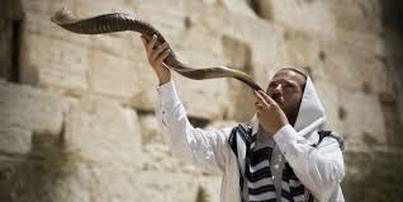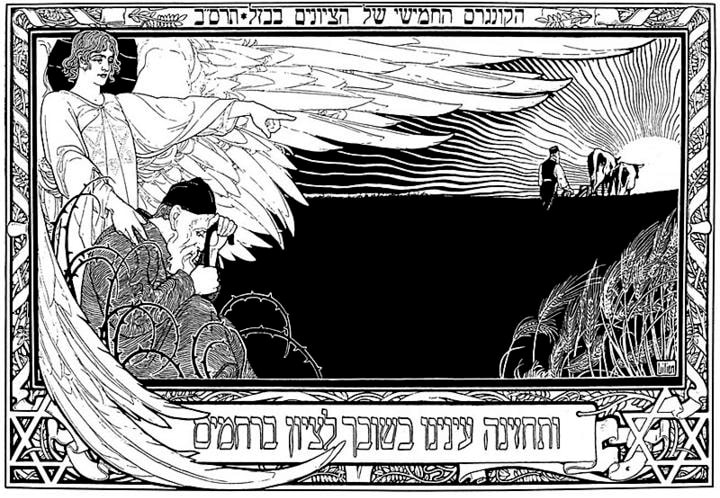
As at this season of the year we go through the time of repentance of the Fall Feasts, we also rehearse the time when our Master will return to establish His Kingdom on earth as it is in Heaven under, His ruler and that of His children. As Yochanan the Immerser borrowed from the prophet Isaiah the preparatory messianic words, "Prepare the way of Adonai!", (Is 40:3; Mat 3:3) it is through deep honest repentance and a renewed commitment to obey that we prepare our heart towards the establishment of this Kingdom of Messiah on earth. Similarly, in this parasha Moshe seeks to prepare the heart of the Children of Israel's before their entry into the Promised Land.
This preparation took the form of a song, a song that will stand not only as an inter-generational time capsule, but as a testimony throughout the ages that Israel is accountable for its action and is fully knowledgeable of the Torah, Its commandments, Its rewards, and Its retributions.
ועתה כתבו לכם את־השׁירה הזאת ולמדה את־בני־ישׂראל שׂימה בפיהם למען תהיה־לי השׁירה הזאת לעד בבני ישׂראל׃
"Therefore, write this song for yourselves, and teach it to the people of Isra'el. Have them learn it by heart, so that this song can be a witness for me against the people of Isra'el.
(Deu 31:19 CJB)
We learn history through the songs that people wrote. The songs of Israel also tell us of its history. The sages recorded ten such major songs/poems in the Torah. Each contributes to tell of some major event in Israel's history, mainly, military victories through HaShem's Mighty Hand. I will try to list them here. These all could be seen as microcosms of HaShem's final deliverance of His people at the end of this age, which by Jewish reckoning comes in the backdrop of the Fall Festivals.
1. Psalm 92. THE SONG OF THE SHABBAT which starts with, " It is good to give thanks to Adonai and sing praises to your name, `Elyon, to tell in the morning about your grace and at night about your faithfulness, to the music of a ten-stringed [harp] and a lute, with the melody sounding on a lyre..."
Psalm 92 is known to be the song for the Shabbat. The song Adam sang after creation was completed. That is why it is part of Friday nigh Kiddush liturgy. The writer of the letter to the first century messianic believers in Israel called, The Letter to the Hebrews compares entering the Land to entering the Sabbath; a microcosm of entering the Messianic Age.
2. Exodus 15: SONG OF THE SEA which starts with, Then Moshe and the people of Isra'el sang this song to Adonai: "I will sing to Adonai, for he is highly exalted: the horse and its rider he threw in the sea. Yah is my strength and my song, and he has become my salvation. This is my God: I will glorify him; my father's God: I will exalt him ..."
This song also speaks of Israel's salvation; of it becoming a new nation as they entered the Promised Land, which should have happened in less then six months were it not for the incident of the ten spies.
3. Numbers 21:16-18: SONG OF THE WELL. "From there they went on to Be'er [well]; that is the well about which Adonai said to Moshe, "Assemble the people, and I will give them water." Then Isra'el sang this song: "Spring up, oh well! Sing to the well sunk by the princes, dug by the people's leaders with the scepter, with their staffs!" ...
In Hebrew, "Well" in this case refers to a source for water. This song was sung as a result of the miracle that HaShem performed to save the Israelites from the Amorites' ambush by using water. As the Hebrews were preparing to cross the second of two mountain ranges that bordered the Arnon River, the Amorites hid in caves. Because those who carried the Ark of the Covenant preceded the Israelites, it caused the mountains to sink and the valley to rise, crushing the Amorites in their hideouts in the caves. The Hebrews would not have noticed this if the Well of water which accompanied them did not throw up pieces of the corpses. Thus this miracle of the Well performed by HaShem resulted in the Hebrews bursting forth in the "Song of the Well" in commemoration of this miraculous event.
4. Deuteronomy 31:30-32;1 THE SONG OF MOSHE. Then Moshe spoke in the hearing of the whole assembly of Isra'el the words of this song, from beginning to end: "Hear, oh heavens, as I speak! Listen, earth, to the words from my mouth! ..."
This song reflects the vicissitudes of the present and future destiny of Israel, the ups and downs, the rises and the declines. It is not a testimony to the past, but rather a warning for the present and the future. It was sung to a people who were mostly already born into physical freedom, so there was no need for the Hebrews to suddenly rejoice in song as at the "Sea at the Sea", but rather, to listen and hear Moses in a restrained and dour manner. We should listen to this song in the same manner as they.
5. Joshua 10:10-14 THE SONG OF GIVON, (a song taken from the book of Jasher) Then, on the day Adonai handed over the Emori to the people of Isra'el, Y'hoshua spoke to Adonai; in the sight of Isra'el he said, "Sun, stand motionless over Giv`on! Moon, you too, over Ayalon Valley!" So the sun stood still and the moon stayed put, till Isra'el took vengeance on their enemies. This is written in the book of Yashar. The sun stood still in the sky and was in no rush to set for nearly a whole day. There has never been a day like that before or since, when Adonai listened to the voice of a man; it happened because Adonai was fighting on Isra'el's behalf.
Joshua exhorted the "sun [to] stand still upon Gibeon in order to enable him to wage war and to defeat Adoni-Zedek, king of Jerusalem and his allies and enable the Israelites to enter Canaan and set up the divisions of land for each tribe as well as establishing This Song was sung by the Prophetess Deborah (or "D'vorah" in Hebrew) after the Hebrew armies defeated the armies of Canaan, led by their general, Sisera.
6. Judges 5:1-2, THE SONG OF DEBORAH. "On that day D'vorah and Barak the son of Avino`am sang this song: "When leaders in Isra'el dedicate themselves, and the people volunteer, you should all bless Adonai."
This Song was sung by the Prophetess Deborah after the Israelite armies defeated the armies of Canaan, led by their general, Sisera. Devorah also sings about Yael, the wife of Heber the Keni, who used a spike and a hammer to drive the spike through the head of Sisera while he slept.
7. 1 Samuel 2:1-10: THE SONG OF HANNAH. Then Hannah prayed; she said: "My heart exults in Adonai! My dignity has been restored by Adonai! I can gloat over my enemies, because of my joy at your saving me. "No one is as holy as Adonai, because there is none to compare with you, no rock like our God...."
Hannah was the mother of the Prophet Samuel. The Song of Hannah calls attention to the "humiliation" and "misery" of a barren woman, namely Hannah herself (1 Samuel 1:11), who confides her pain to HaShem. After her prayers are completed, she is then blessed with a child, Samuel. Essentially, the Song of Hannah is the story of a woman who was barren for a long time and then was blessed with a child. It is comparative to Jerusalem who births He Who shall be the Judge over all the earth!
8. 2 Samuel 22/Psalm 18. THE SONG OF DAVID. David said the words of this song to Adonai on the day Adonai delivered him from the power of all his enemies and from the power of Sha'ul. He said: "Adonai is my Rock, my fortress and deliverer, the God who is my Rock, in whom I find shelter, my shield, the power that saves me, my stronghold and my refuge. My savior, you have saved me from violence..."
King David recounts the desperate state of his very survival and existence during parts of his long and varied career. After HaShem saved him from the hands of all his enemies and from the hands of Saul the King of Israel prior to David, he sings a song of praise and dedication to the God of his salvation.
9. SONG OF SONG or SONG OF SOLOMON The Ultimate Song, by Shlomo: "[She] Let him smother me with kisses from his mouth, for your love is better than wine..."
The Song of Songs is traditionally seen to be an allegory for the relationship between HaShem and Israel by utilizing the example of the love between a man and a woman. A careful reading unveils the Messiah coming to his bride who did not open the door for him as swiftly as she should have. The text then tells us that He leaves,leaving myrrh on the door-knob of her house. (Song of Songs 5)
The woman in the song is not the quintessential 'woman" as so often alluded to, but rather the Bride of Messiah, the Congregation!
10. Isaiah 26:2-3 SONG OF MASHIACH. This song has not been sang yet. It will be sung at the times of Mashiach after He returns to establish His Kingdom on earth, as it is in Heaven. This song will be sang by the 144.000 redeemed fromthe 12 tribes of Israel, those redeemed as the firstfruit of humanity. (Rev 7 and 14)
"MAY OUR EYES BEHOLD YOUR RETURN UNTO ZION IN MERCY!"
ותחזינה ענינו בשובך לציון בשובך ברכמים
The Amida
Then I looked, and there was the Lamb standing on Mount Tziyon; and with him were 144,000 [12.000 from each tribe Rev 7]who had his name and his Father's name written on their foreheads. I heard a sound from heaven like the sound of rushing waters and like the sound of pealing thunder; the sound I heard was also like that of harpists playing on their harps. They were singing a new song before the throne and before the four living beings and the elders, and no one could learn the song except the 144,000 who have been ransomed from the world.
(Rev 14:1-3 CJB)
Then I saw another sign in heaven, a great and wonderful one -- seven angels with the seven plagues that are the final ones; because with them, God's fury is finished. I saw what looked like a sea of glass mixed with fire. Those defeating the beast, its image and the number of its name were standing by the sea of glass, holding harps which God had given them. They were singing the song of Moshe [Deut 32], the servant of God, and the song of the Lamb [Rev 14:3]:
"Great and wonderful are the things you have done, Adonai, God of heaven's armies! Just and true are your ways, king of the nations! Adonai, who will not fear and glorify your name? because you alone are holy. All nations will come and worship before you, for your righteous deeds have been revealed." (Rev 15:1-4 CJB)

 RSS Feed
RSS Feed